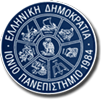Constantza
Communal organizations

Author: ARDELEANU KONSTANTIN
Greek community

Jewish community

Armenian community

Bulgarian community

Polish community

German community
The legal organisation of the ethnic–religious communities in Romania was possible after 1860, when Prince Alexandru Ioan Cuza accepted their right to gather in juridical communities, with clear statutes and responsibilities settled according to Romanian law. Before this moment (and even after it, until 1880, when Romanian independence was recognised by all European powers), foreigners gathered in de facto ethnic and religious associations made up for the preservation of that community’s religious and / or national identity.
In the second half of the 19th century, as Romania struggled to eliminate this foreign jurisdiction, communities began to organise themselves as legal entities, with well defined statutes and with representatives who served as relays between those associations and the Romanian institutions. In terms of religious services, this was extremely important after the secularisation of church properties and the compulsory use of Romanian in state churches (1863), when the foreign communities, backed by consuls, settled with the Romanian authorities the organisation and subordination of the “foreign” churches. The same impositions were valid in relation to the existence of the communities’ schools, which had to obey Romanian educational law. Not least of all these arrangements were extremely important for the community’s patrimony and fiscal obligations in relation to the Romanian state.
Some of the largest communities were the Greek community, the Jewish community, the Bulgarian community, the Armenian community, the Muslim community etc.
Back




